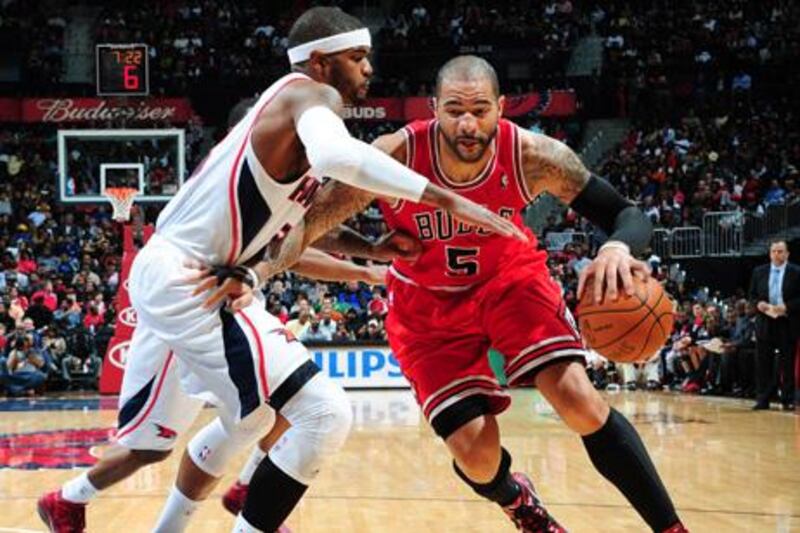For a while, there was no basketball. Now, there is a basketball overload - eight, 10, 12 games daily. It might not be too much yet for players. Just wait, though.
To recover some lost revenue from the lockout, the NBA is picking the pockets of compliant fans and media advertisers by subjecting teams to a preposterously demanding schedule.
Each team is cramming 66 games in a window of between 120 to 122 days, meaning days off are outnumbered by days on.
Television ratings and in-house attendance have picked up, a predictable expression of pent-up anticipation.
Another factor is momentum carried over from the abundance of alluring Christmas match-ups.
Since that wondrous opening day, games have been reasonably competitive and artistic.
At some point, the law of diminishing returns will impose itself, and discerning viewers will notice less effort than usual through the season's long slog.
The absurdity of the schedule was hammered home last Saturday, when the Atlanta Hawks played at home against Chicago. The night before, they were working in Charlotte. Two nights before, they were home against Miami. Three nights before …
Well, let's just sum up the ordeal: nine games, connected by eight flights to or from Atlanta, in 12 days.
Four games in six days alone against the Bulls and the Heat, the Eastern Conference's twin terrors.
The back-to-back-to-backs that brought the Hawks staggering across the finish line on Saturday was intensified by a combined four overtimes.
"Three games felt like four or five," Atlanta's Joe Johnson said.
The Hawks had plenty of company in their exhaustive sprint out of the blocks.
Seven other teams endured eight games in the season's first dozen days.
Do not mistake this as a declaration of sympathy for players. They live and travel lavishly, get paid piles of money taller than themselves and can head home after a few hours work each day.
Besides, their union signalled acceptance of the compacted scheduled by signing off of it.
The league should care that the hectic routine eventually will compromise quality of play.
If practice makes perfect, as the saying goes, the reduction in the amount of training time will create a product fraught with imperfections.
Where is the forcibly retired Allen Iverson now that the league could accept notoriously practice-averse players such as the I-man?
Ten years have passed since Iverson unleashed a meandering rant after his coach questioned his absence from practice. A brief excerpt, preserved in perpetuity on YouTube:
"We're sitting here, and I'm supposed to be the franchise player, and we're talking about practice. … Not the game that I go out there and die for and play every game like it's my last, but we're talking about practice, man. How silly is that?"
This is sillier: over the next month, beginning tomorrow, the Detroit Pistons intend to conduct three practices. Do the maths: one practice every 10 days. Read it and weep, Iverson.
Many teams that wake up to the blessed rarity of two successive days without a game will devote one to rest and relaxation, or perhaps to video sessions.
Out of necessity, some coaches are converting the game day shoot around, a leisurely activity by tradition, into mini-practices.
That is a Band-Aid on the learning-on-the-fly nature of the NBA, 2011/12.
"We just kind of show up for the games and hope they know how to play," Frank Vogel, the Indianapolis Pacers coach, said.
Funny one-liner. With several kernels of truth, too.
Surely there was no chuckling at NBA headquarters at the point made by the Dallas Mavericks' Dirk Nowitzi, a barb as accurate as his 18-foot jump shots.
He is aghast at the impending grind from the mad scheduling.
"We know this league is about money, so the more games they get, the more money they make," Nowitzki said.
"So it's really not about the product that much to them. But it is what it is."
Defenders of the format will point to the scoreboard in Atlanta at the end of that impractical stretch: Hawks 109, Bulls 94.
Look at the game's big picture. See a result that is surprising, but not enough to snap your dropping jaw.
Chicago were spent from their third road game in four evenings, the second of which was a taxing win over the Orlando Magic. The Hawks were only slightly worse off as it turned out.
Casual fans may not care about the demands on the players, as long as their senses tingle from watching nightly highlights of slam dunks, alley-oops, behind-the-back dribbles, needle-through-a-haystack passes and LeBron James powdering his hands.
The more discriminating among us though are liable to tune out more than usual as the season ploughs along.
Call us on the eve of the play-offs, when teams finally might be afforded the chance to practice two days in a row.





